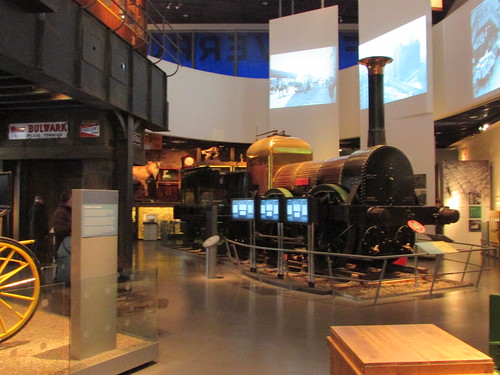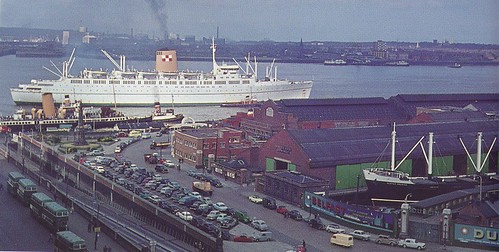
'Lion', now exhibited at the Museum of Liverpool.
'Lion' is a remarkable survivor. The locomotive was built in 1838 by the short-lived locomotive building partnership of Todd, Kitson and Laird as part of an order for the Liverpool and Manchester Railway. It was designated a 'luggage engine' meaning it was intended for freight trains. At that period, express engines were normally 'single-wheelers' (there's an article on 'single-wheeler types here). 'Lion', with a wheel arrangement of 0-4-2, had four coupled wheels, making it suitable for freight working. The engine spent some time as a bank engine on the Whiston Incline of the Liverpool and Manchester Railway.
During that early period of railways, locomotives were largely built using the skills of blacksmiths and frequent repair or modification was commonplace. 'Lion' was useful enough to survive with various rebuildings (replacing the boiler at least once and the cylinders apparently twice) long enough to pass into the stock list of the Grand Junction Railway in 1845 and, the following year, the London and North Western Railway. In 1859, the London and North Western Railway raised £400 by selling the redundant 'Lion' to the Mersey Docks and Harbour Board (there's a short article about the dock company here).
The Mersey Docks and Harbour Board modified 'Lion' to serve as a stationary engine driving a Ladder Pump used to empty the Princes Graving Dock each time another ship required to be dry-docked. 'Lion' was entombed in a rather handsome Pumphouse (see the article here) which originally had an associated brick chimney. 'Lion' served faithfully in this unusual role until around 1923 when members of the Liverpool Engineering Society discovered the stationary engine on a visit. Their research into the unidentified 'Old Locomotive' revealed that it was the 1838 'Lion'. After electric pumps replaced the Ladder Pump, the remains of 'Lion' were donated by the Mersey Docks and Harbour Board to the Liverpool Engineering Society for preservation.
At that time, preparations were in hand to celebrate the 1930 Centenary of the Opening of the Liverpool and Manchester Railway and the London Midland and Scottish Railway were induced to restore 'Lion' into a working locomotive capable of giving rides to the public on a continuous track laid in Wavertree Park as part of a major exhibition. After its long incarceration in the Pumphouse, 'Lion' will never be forgotten again and this amazing machine has earned the affection of many people on its various exploits since re-discovery. Some of these exploits are briefly chronicled in this blog under the label 'OLCO'.
The Pumphouse has been demolished and the area redeveloped but I recently discovered a book called 'Reflections on a River' which has an excellent collection of colour photographs illustrating Liverpool Docks from the time when I was growing up, including the splendid view below which clearly shows the Pumphouse in 1961. The book is still available on the second-hand market.

Liverpool Pierhead in 1961 with the 'Empress of Britain' dominating the scene. Of interest to rail enthusiasts is the rare view of the Pumphouse (to the left of the 'Belfast' hoarding) from where the locomotive 'Lion' was rescued (Photo: N.P.B. collection from 'Reflections on a River').
Click for larger view.
'Lion' now has a more peaceful (if static) life as the star exhibit in the Great Port Gallery at the Museum of Liverpool.
There is a modern society, called 'The Old Locomotive Committee' dedicated to research about Lion's history and the construction of working models of the original with a website Lion & Old Locomotive Committee
Related posts on other websites
Lion & Old Locomotive Committee
Related posts on this website
'Lion' and the Pumphouse.
"Lion's" History (abstracted from the Engineer Nov 14, 1930).
More about 'Lion' (abstracted from Meccano Magazine 1930).
The Old Locomotive Committee.
Lion.
All my posts about the Old Locomotive Committee and 'Lion' can be found here.
My Pictures
Where necessary, clicking on an image above will display an 'uncropped' view or, alternately, pictures may be selected, viewed or downloaded, in various sizes, from the collection of albums listed:-
The Old Locomotive Committee and Lionsmeet
